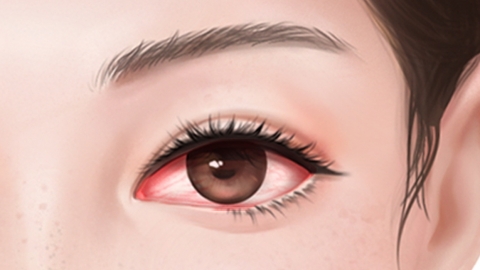What causes eye discharge (sleep) in the morning, and what medication should be taken?
Eye discharge refers to secretions. The presence of eye secretions upon waking in the morning may be caused by normal physiological phenomena, sleep environment factors, allergies, conjunctivitis, dry eye syndrome, or other reasons. It is recommended to use medications such as Emedastine Difumarate Eye Drops, Tobramycin Dexamethasone Eye Drops, Sodium Hyaluronate Eye Drops, Recombinant Bovine Basic Fibroblast Growth Factor Eye Drops, and Cyclosporine Eye Drops according to medical advice. Patients should visit a hospital and receive symptomatic treatment under the guidance of a doctor. The detailed analysis is as follows:

1. Normal physiological phenomenon: There are many meibomian glands around the human eye. These glands secrete oils during sleep, which mix with tears and impurities such as dust to form secretions. Especially upon waking in the morning, the eye discharge may be more noticeable due to lack of blinking for an extended period. This is a normal physiological phenomenon and generally does not require special treatment; maintaining eye hygiene is sufficient.
2. Sleep environment factors: If the sleeping environment is dry, hot, or poorly ventilated, it can cause tears on the eye surface to evaporate too quickly, leading to dry eyes. To protect the eyes, the lacrimal glands will secrete more tears, which may mix with impurities such as dust overnight and form secretions in the morning. This typically does not require drug treatment, and maintaining moisture is recommended.
3. Allergy: Individuals with allergic constitutions may experience eye allergies when exposed to allergens such as willow catkins, pollen, or animal dander, leading to increased eye secretions and the appearance of this symptom. It is recommended to avoid allergens and apply cold compresses to alleviate symptoms. If necessary, antihistamine medications can be taken under medical guidance. Commonly used medications include Emedastine Difumarate Eye Drops, Tobramycin Dexamethasone Eye Drops, and Sodium Cromoglicate Eye Drops, which help alleviate allergic reactions.
4. Conjunctivitis: When the eye's surface defense capability weakens or external pathogenic factors intensify, conjunctivitis may develop, causing this phenomenon. Under a doctor's guidance, Sodium Hyaluronate Eye Drops or Polyvinyl Alcohol Eye Drops can be used to lubricate the eyes. Additionally, medications such as Levofloxacin Eye Drops, Ofloxacin Eye Drops, or Gatifloxacin Eye Drops may be used as directed to combat infection and alleviate symptoms.
5. Dry eye syndrome: Prolonged eye use leading to excessive eye fatigue may prevent the eyes from producing sufficient tears or cause tears to evaporate too quickly, potentially resulting in dry eye syndrome. This can lead to increased secretions and accompanying eye dryness. It is recommended to use medications such as Sodium Hyaluronate Eye Drops, Recombinant Bovine Basic Fibroblast Growth Factor Eye Drops, or Cyclosporine Eye Drops under medical guidance for treatment.
It is recommended to maintain good eye habits, avoid prolonged eye strain, enhance eye hygiene, and thoroughly remove makeup before bedtime.









